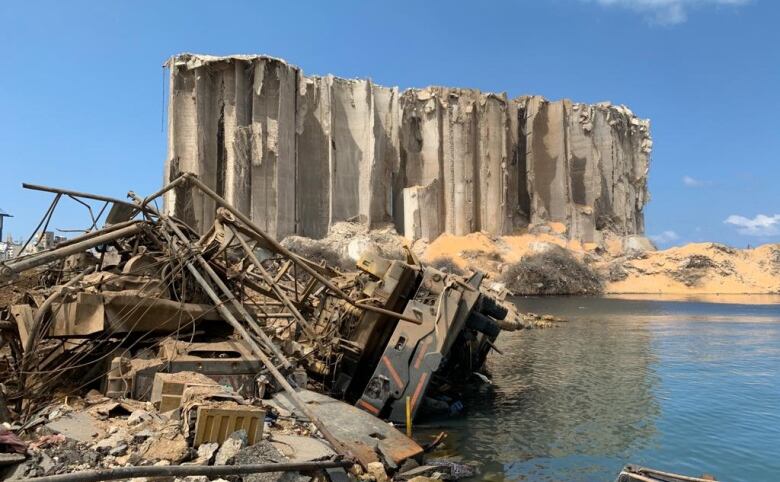A Lebanese diplomat was appointed to form a new government on Monday after winning the backing of major political parties in the crisis-hit country, which is still reeling from a devastating explosion that killed and wounded thousands of people.
President Michel Aoun asked Lebanon's ambassador to Germany, Mustapha Adib, to form a new government after he secured 90 votes among the legislators in the 128-member parliament.
The consultations were being held hours before French President Emmanuel Macron was due to arrive for a two day-visit, during which he is expected to press Lebanese officials to formulate a new political pact to lift the country out of its multiple crises. At least 190 people died and 6,000 were injured in the Aug. 4 blast, which devastated the city's port and caused widespread damage to residential and commercial areas in the capital.
The government resigned less than a week after the blast.
Adib told reporters his number one priority will be to quickly form a government able to implement crucial reforms to regain the trust of the Lebanese and international community.
'Narrow' opportunity
He said he will form a cabinet of experts and will work with parliament to "put the country on track of improvement and to end the dangerous financial, economic and social drainage."
"The opportunity in front of our country is narrow, and the mission that I accepted is based on all political groups knowing that. The government should be formed very quickly," he said.
Macron and other world leaders as well as the International Monetary Fund have refused to give assistance to Lebanon before its leaders enact major reforms. The swift consensus around Adib, a little known diplomat, signalled a sense of urgency by Lebanon's traditional politicians to try and contain the rapidly worsening economic and financial crisis and show movement ahead of Macron's visit.

Former prime minister Saad Hariri emerged from his meeting with Aoun on Monday, telling reporters his 18-member bloc had given its backing to Adib. He called for the formation of a government of experts "that implement reforms aimed at restoring the world's confidence in our economy so we can start to emerge from this crisis."
Adib, who returned to Lebanon from Germany on Saturday, was the only name to emerge as a favourite for the post of prime minister, who — according to Lebanon's sectarian-based power-sharing system — has to be a Sunni Muslim. The candidate who gets the most support is asked to form the new cabinet, but Lebanon's divided political class has often been bogged down over who holds senior posts and key ministries.
Adib was named by four former prime ministers, including Hariri, on the eve of Monday's consultations.
Earlier Sunday, the head of the powerful Hezbollah militant group, Hassan Nasrallah, said his supporters will co-operate and facilitate the formation of a government that would be able to improve economic conditions and undertake major reforms.
The Iran-backed militant group, which has a dominant role in Lebanon's politics, has come under intense criticism and public scrutiny as the country faces multiple devastating crises. Hezbollah and its allies were also expected to name Adib.
Even before the explosion, an unprecedented economic crisis had already sapped the Lebanese currency of more than 80 per cent of its value, driving unemployment, poverty and inflation through the roof.
Restrictions reintroduced
Coronavirus infections and deaths have also spiked, pushing authorities to reintroduce some restrictions on economic and social activities that have largely been ignored amid the slump. And the recent explosion badly damaged the port of Beirut, a main trade channel for the small country, which depends on imports.
Prime Minister Hassan Diab's government, backed by Hezbollah and its allies, resigned on Aug. 10, six days after more than 2,700 tonnes of ammonium nitrate exploded in Beirut's port, where it had been stored for six years.
Adib, who has been Lebanon's ambassador to Germany since 2013, served as an adviser to one of Lebanon's former prime ministers, Najib Mikati. He took part in the committee in charge of writing Lebanon's new electoral law in 2005 and 2006, and acted as chief of cabinet in 2011.
The 48-year-old is a native of the northern city of Tripoli, holds a PhD in law and political sciences and had taught in universities in Lebanon and France.
tinyurlis.gdu.nuclck.ruulvis.netshrtco.detny.im
مقالات مشابه
- ایان هولم بازیگر شناخته شده برای ارابههای آتش و ارباب حلقه ها مرده در 88
- کتابهای علوم پزشکی
- ترجمه فنی: از مترجمان متخصص خود به چه چیزی نیاز دارید؟
- میت رامنی می پیوندد Black Lives Matter معترضان در واشنگتن
- GOP senator questions Trump giving RNC speech from the White House: 'Is that even legal?'
- ایالات متحده در فضا نیروی فقط راه اندازی اولین ماموریت
- Trump's White House RNC address was shamelessly illegal
- آمازون می گوید ایمیل به کارمندان ممنوع Infinite شد ارسال شده در خطا'
- شرکت صادرات و واردات کالاهای مختلف از جمله کاشی و سرامیک و ارائه دهنده خدمات ترانزیت و بارگیری دریایی و ریلی و ترخیص کالا برای کشورهای مختلف از جمله روسیه و کشورهای حوزه cis و سایر نقاط جهان - بازرگانی علی قانعی
- این جوان نیجریه رقصنده با هدف تغییر راه مردم دیدن باله